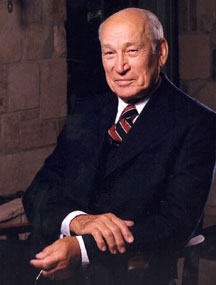Vol. 4 Issue 18 / May 24, 2004
In Memoriam:
Arnold O. Beckman (1900 – 2004)
Arnold O. Beckman, a leading scientist, inventor, philanthropist,
and business and civic leader, died on May 18 at the age of 104.
"We offer our condolences to the Beckman family," says Scripps Research
President Richard A. Lerner. "Arnold's science and philanthropy left a
lasting legacy on the Scripps Research campus, as well as on the face
of American science, business, and education."
The Arnold and Mabel Beckman Foundation, which issues grants on the
behalf of Beckman and his wife, provided major funding toward the Arnold
and Mabel Beckman Center for Chemical Sciences, a building that opened
in 1996 on the Scripps Research campus. Today, the Beckman Center houses
more than 400 scientists in fields such as molecular design, chemical
synthesis, and bio-organic chemistry.
Born in Cullom, Illinois, on April 10, 1900, Beckman graduated from
the University of Illinois with a bachelor's degree in chemical engineering
and master's degree in physical chemistry. He received his doctoral degree
in photochemistry in 1928 from the California Institute of Technology,
where he also served on the faculty for a number of years.
In 1935, Beckman founded National Technical Laboratories, later renamed
Beckman Instruments, to manufacture an inexpensive pH meter he had invented
for use in citrus juicing plants.
"When you're faced with the necessity to do something, that's a stimulus
to invention," Beckman once said. "If (my classmate) hadn't come in with
his lemon juice problem, chances are I never in the world would have thought
about making a pH meter."
A forerunner of modern electrochemical instrumentation, this piece of
scientific instrument simplified and expedited acidity and alkalinity
measurements. It quickly became a ubiquitous tool in the laboratory and
later earned Beckman a place in the National Inventors Hall of Fame next
to inventors such as Thomas Edison and Alexander Graham Bell.
In 1940, Beckman's company introduced another of his revolutionary inventions—a
spectrophotometer. The spectrophotometer improved biological assays from
a process that took weeks and achieved 25 percent accuracy to one that
took minutes and achieved 99.9 percent precision. Although new models
were introduced through the years, many of these original instruments
are still in use today.
The same year, the company introduced the "helipot," a variable resistance
device that found use in a wide variety of electronic equipment.
Beckman Instruments grew to become one of the world's leading suppliers
of instruments and related products for health care and life sciences.
Today, the company has over 5,700 employees in 35 facilities worldwide.
"The past years have been rewarding for me in many ways," the Beckman
Foundation quotes Beckman as saying. "Perhaps the greatest reward is the
knowledge that Beckman products have contributed and are contributing
to the benefit of mankind."
By the time he celebrated his 100th birthday, Beckman had given more
than $270 million to support scientific research.
He received numerous honors and awards throughout his life, among them
the l989 National Medal of Science, the1989 Presidential Citizens Medal,
the 1988 National Medal of Technology, the 1999 Public Welfare Medal from
the National Academy of Sciences, and twelve honorary degrees.
Send comments to: mikaono[at]scripps.edu
Go back to News & Views Index
|

Scientist, inventor, and philanthropist Arnold O.
Beckman died this week at the age of 104. Photo by Antony
di Gesu.
|



